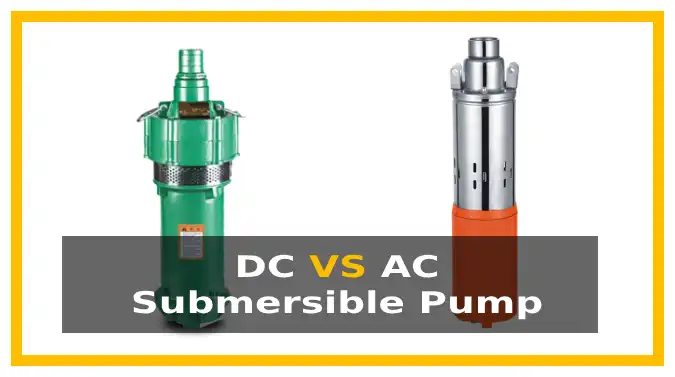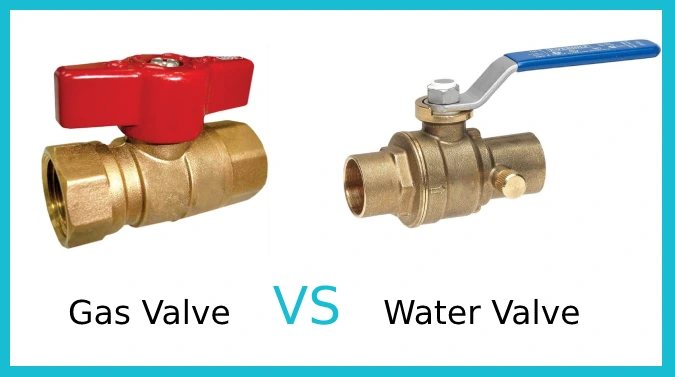Last Updated on July 18, 2023
Submersible pumps are reliable, efficient, and capable of pumping water from deep wells or underground reservoirs. However, when choosing between DC and AC submersible pumps, you may wonder which is better for your needs.
Regarding applications, DC pumps are ideal for remote locations and off-grid systems. Conversely, AC pumps are better suited for larger-scale commercial and industrial applications.
A DC submersible solar pump is more energy-efficient, giving the highest output with fewer solar panels. AC submersible solar pumps need extra solar panels to convert the electricity into AC.
Today, we’ll comprehensively compare DC vs AC submersible pumps. We’ll discuss each type’s advantages and disadvantages, efficiency, power supply requirements, and other important factors you should consider before purchasing. So continue reading.
DC vs AC Submersible Pump: A Comprehensive Comparison

If you’re considering a submersible pump, you should understand the differences between DC and AC power sources.
- Power Source:
- Efficiency:
- Lifespan:
- Speed Control:
- Applications:
- Noise:
- Service Life:
- Cost:
1. Power Source:
DC submersible pumps are perfect for portable and off-grid applications, as they can directly utilize power from batteries or solar panels. In contrast, AC submersible pumps rely on a continuous and reliable power supply from the electrical grid or a generator.
Here are three key differences in the power source requirements for DC and AC submersible pumps:
- DC pumps are self-sufficient, ideal for remote locations or off-grid applications where a reliable power source is unavailable. With a DC submersible pump, you can directly connect it to a battery or solar panel, and it will function without issue.
- AC pumps require a constant and reliable power source to operate. This means they are best suited for applications with a consistent electricity supply, such as in urban areas or locations connected to the electrical grid.
- DC pumps are more energy-efficient than AC pumps, as they don’t require an inverter to convert DC power to AC power. This means they can provide the same performance with less energy consumption, making them a more sustainable option for many applications.
2. Efficiency:
You can improve the overall performance of your water system by considering the energy efficiency of your submersible pump. DC pumps, especially those with brushless DC motors, can achieve high efficiencies at various speed ranges.
Conversely, AC pumps are typically designed for higher speeds and larger bursts of power but may have lower overall efficiency than DC pumps.
3. Lifespan:
When selecting a submersible pump, consider the motor’s lifespan to ensure it will last long. DC pumps are generally known to have a shorter working lifespan compared to AC pumps. This is because DC motors have a design that makes them less durable than AC motors.
DC motors have brushes that wear out over time, which can cause the motor to fail. Additionally, DC pumps have a higher chance of overheating, which can further reduce their lifespan.
Conversely, AC submersible pumps are known for their longer working lifespan. They are built with a well-suited motor design for durability and longevity.
AC motors have a simpler design than DC motors, making them less prone to wear and tear. AC motors also have a lower chance of overheating, contributing to their longer lifespan.
4. Speed Control:
Regarding DC pumps, speed control is much simpler and straightforward compared to AC systems. DC pumps can be easily controlled without additional components or controllers. This makes them ideal for those who want a pump easily adjusted based on their needs.
Alternatively, AC submersible systems typically require a controller to manage speed, making speed control more complex than DC pumps. With AC systems, speed control can be achieved by adjusting the frequency of the power source.
A controller is needed to ensure that the frequency is within the acceptable range for the pump. This makes AC pumps a bit more challenging than DC pumps.
| DC Pumps | AC Pumps |
| Speed control is straightforward | Speed control is more complex |
| Easily controlled without additional components or controllers | Requires a controller to manage speed |
| Ideal for those who want a pump that can be easily adjusted based on their needs | Frequency of the power source needs to be adjusted to manage speed |
| Simple and easy to use | More challenging to use compared to DC pumps |
5. Applications:

Imagine having a reliable water system that can be used for various applications, from watering your garden to running your household appliances. DC submersible pumps are perfect for off-grid and portable setups, making them a great choice for those who want to utilize renewable energy sources.
Here are three specific applications where DC submersible pumps shine:
- Solar-powered systems: DC pumps are ideal for solar-powered systems since they can operate on low voltage, making them more efficient and cost-effective.
- Water wells: DC pumps can be used in water wells since they’re submersible and operate on low voltage, making them reliable and efficient for pumping water from deep wells.
- Portable setups: DC pumps are perfect for portable setups since they’re compact and easily transported. They’re commonly used in camping and RV setups and emergency water situations.
In contrast, AC submersible pumps are often employed in agricultural, industrial, and commercial applications with access to a continuous and reliable AC power source. They’re commonly used in irrigation systems, fish farming, and wastewater treatment plants.
6. Noise:
Submersible pumps make a distinct sound during operation, with DC pumps generally being quieter due to their brushless motor technology. As DC motors use permanent magnets that rotate around a fixed stator, friction, and noise are reduced since there is no physical contact between the rotor and stator.
Conversely, AC pumps may generate more noise over time due to older motor technology, which can contribute to noise levels during operation. The AC motor operates through the flow of alternating current, which causes the rotor to rotate, and the rotating magnetic fields can produce a humming sound.
7. Service Life:
DC pumps have copper coils in their motors, contributing to their durability and longer service life. Meanwhile, AC pumps commonly feature aluminum coils more prone to deterioration, necessitating more frequent servicing and potentially shorter service life.
8. Cost:
When purchasing a solar-powered pump, you should consider the cost implications of your decision. This will impact your budget and overall affordability. Here are three cost-related factors to keep in mind when choosing between a DC and AC submersible pump:
- Initial Cost: DC pumps are more expensive than AC pumps due to their higher efficiency and specialized technology. However, long-term savings on electricity bills can offset this cost.
- Maintenance Cost: DC solar pumps may require specialized personnel for servicing, which can add to the maintenance cost. On the other hand, AC submersible pumps are generally easier to handle in emergencies and may have lower maintenance costs.
- Solar Panel Requirements: AC pumps require an inverter to convert DC power from solar panels to AC power for the pump. This can add to the installation cost and require more solar panels to generate enough power. DC pumps, however, require fewer solar panels due to their high efficiency.
What are the advantages of DC Submersible pump over AC Submersible pump?
You’ll find that DC Submersible pumps offer greater convenience and portability than AC pumps, thanks to their ability to operate directly from a battery. This feature makes them an ideal choice for remote locations.
With DC pumps, you don’t need to worry about finding a power source, which can be especially helpful when you need to pump water in areas off the grid.
Plus, since they don’t require a controller to manage speed, they’re easier to operate and control. Another advantage of DC Submersible pumps is their energy efficiency.
AC pumps can waste a lot of energy because they convert AC power into DC power, resulting in energy loss. With DC pumps, there’s no need for this conversion process, so they’re more efficient and can save you money on long-term energy costs.
Are DC Submersible pumps more efficient than AC Submersible pumps?
If you want to save on energy costs and have a reliable pump, consider opting for the more efficient option – the DC submersible pump. Compared to AC submersible pumps, DC pumps use less energy which translates to lower energy costs.
Here are some reasons why DC submersible pumps are more efficient than their AC counterparts:
- DC pumps are powered by direct current, which means there’s no need for an AC-DC converter. This eliminates energy losses that occur in the conversion process.
- DC pumps have a higher power factor compared to AC pumps. This means that DC pumps convert a higher percentage of the energy they consume into useful work.
- DC pumps have a higher starting torque than AC pumps. This means they can start pumping water with less energy consumption.
- DC pumps have a wider speed control range than AC pumps. This means that DC pumps can operate at different speeds depending on the demand, which reduces energy consumption.
- DC pumps have a longer lifespan compared to AC pumps. This means you’ll save money in the long run by replacing your pump less frequently.
Which supply is more powerful, AC or DC, for Submersible pumps?

Consider which power supply is more powerful when comparing AC and DC submersible pumps. While both types of pumps have advantages, DC submersible pumps are more powerful than their AC counterparts. This is because DC power is more consistent and reliable than AC power.
AC power can fluctuate and even drop voltage to zero several times per second, affecting the pump’s ability to maintain a constant flow rate. In contrast, DC power remains constant and doesn’t drop to zero, providing a more reliable and powerful energy source for the submersible pump.
DC or AC Submersible Pumps: Choose the Right One for You
Choosing the right submersible pump is tricky, especially regarding DC or AC options. The purpose of this article is to give you the knowledge you need to make an informed decision between two pumps.
DC submersible pumps offer impressive energy efficiency, making them popular among many consumers. But, an AC submersible pump may be the way to go if you require a more potent pump that can handle heavier loads.
By examining the differences and evaluating your specific needs, you can confidently choose the perfect submersible pump for your next project.



